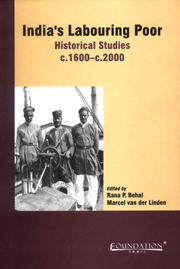Book contents
- Frontmatter
- Contents
- Notes on Contributors
- Frontispiece
- Preface
- Introduction
- Working Across the Seas: Indian Maritime Labourers in India, Britain, and in Between, 1600–1857
- The Brickmakers' Strikes on the Ganges Canal in 1848–1849
- On the Move: Circulating Labour in Pre-Colonial, Colonial, and Post-Colonial India
- Mobility and Containment: The Voyages of South Asian Seamen, c. 1900–1960
- Power Structure, Discipline and Labour in Assam Tea Plantations during Colonial Rule
- “Following Custom”? Representations of Community among Indian Immigrant Labour in the West Indies, 1880–1920
- Masculinity, Respect, and the Tragic: Themes of Proletarian Humor in Contemporary Industrial Delhi
- Stretching Labour Historiography: Pointers from South Asia
- DOCUMENT
- Select Bibliography
Working Across the Seas: Indian Maritime Labourers in India, Britain, and in Between, 1600–1857
Published online by Cambridge University Press: 05 January 2012
- Frontmatter
- Contents
- Notes on Contributors
- Frontispiece
- Preface
- Introduction
- Working Across the Seas: Indian Maritime Labourers in India, Britain, and in Between, 1600–1857
- The Brickmakers' Strikes on the Ganges Canal in 1848–1849
- On the Move: Circulating Labour in Pre-Colonial, Colonial, and Post-Colonial India
- Mobility and Containment: The Voyages of South Asian Seamen, c. 1900–1960
- Power Structure, Discipline and Labour in Assam Tea Plantations during Colonial Rule
- “Following Custom”? Representations of Community among Indian Immigrant Labour in the West Indies, 1880–1920
- Masculinity, Respect, and the Tragic: Themes of Proletarian Humor in Contemporary Industrial Delhi
- Stretching Labour Historiography: Pointers from South Asia
- DOCUMENT
- Select Bibliography
Summary
INDIAN SEAMEN IN THE EUROPEAN WOODEN WORLD
The advent and expansion of trans-oceanic shipping aboard wooden, wind-powered vessels between India and Europe created uniquely onerous working conditions for the Indian seamen who volunteered to labour aboard – conditions distinct from either coastal or land-based employment in either India or Europe. Indian (and European) seamen on such vessels may have been “free labour” prior to boarding ship, but they were in many respects “unfree labour” while at sea. They were unable to change jobs, to vary the amount of labour extracted from them, to increase the compensation or necessities provided, or to quit – in short, to do much to improve their working conditions generally. They sailed for uncertainly long periods of time, confined to constricted, unhealthy spaces and limited diet, almost constantly facing the various dangers of the open sea under the virtually unavoidable, unrelenting, and unalterable hierarchic authority and often brutal physical discipline of European officers.
For most of this period, wars raged in both Europe and India, so these Indian seamen faced threats from hostile navies as well as piratical and meteorological violence. These seamen engaged in intense and necessarily highly coordinated labour with a relatively small but often mixed group of fellow workers of diverse origins; their solidarities were forged over the arduous voyage, often enduring beyond. Their employment terminated in alien ports, during Europe's “Little Ice Age”, with few resources and limited support networks available there except of their own making.
- Type
- Chapter
- Information
- India's Labouring PoorHistorical Studies, 1600-2000, pp. 21 - 46Publisher: Foundation BooksPrint publication year: 2007



